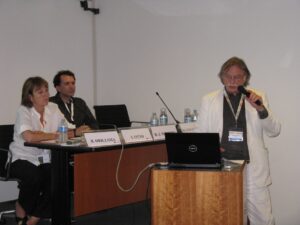
When proposing science debates as tools, opportunities and even tasks for science journalists, a colleague came up and said scoffingly: »It’s still only PR.«
He was not wrong – considering the currently fashionable science debates. (mehr …)
ScienceCom

When proposing science debates as tools, opportunities and even tasks for science journalists, a colleague came up and said scoffingly: »It’s still only PR.«
He was not wrong – considering the currently fashionable science debates. (mehr …)
Science and research arouse desire. Politicians for example hope for solutions for problem which overstrain them, companies look for ever new innovations for their discontinued models in order to increase profits, and lobby groups want to exert influence because knowledge is power.
But what about the scientists themselves and the citizens?
Wissenschaft und Forschung wecken Begehrlichkeiten. Politiker erhoffen sich beispielsweise Lösungen für Probleme, die sie überfordern, Unternehmen suchen nach immer neuen Innovationen für ihre Auslaufmodelle, um Profite zu steigern, und Lobbyinitiativen wollen Einfluss gewinnen, weil Wissen Macht ist.
Was aber wollen eigentlich die Wissenschaftler und die Bürger?
Die Bürger bezahlen zwar Wissenschaft und Forschung, doch die Forschungsthemen setzen Politiker, Unternehmen und Lobbygruppen.
Wissenschafter möchten Neues entdecken, Wissen und Erfahrungen sammeln und weitergeben. Das können sie aber nur dort, wo es ihnen Politiker, Unternehmen und Lobbygruppen gestatten, denn Forschungsgelder werden nur für Ziele vergeben, die im Wesentlichen ihren eigenen Interessen dienen.
It looks like science debates have been discovered as another public relation tool for science and technology. Governments, institutes, even research projects contrive debates – basically to gain acceptance from citizens in order to continue undisturbed.
 Science and technology are always intertwined with the economic and political system. Therefore it needs to be submitted to fundamental democratic procedures. The bodies of the civil society need to be included, according to the publicly funded civil society platform for a change in research (Zivilgesellschaftliche Plattform Forschungswende), which, on 31st May 21013, dedicates an entire day to an in-depth expert discussion at the renowned Berlin Brandenburg Academy of Science.
Science and technology are always intertwined with the economic and political system. Therefore it needs to be submitted to fundamental democratic procedures. The bodies of the civil society need to be included, according to the publicly funded civil society platform for a change in research (Zivilgesellschaftliche Plattform Forschungswende), which, on 31st May 21013, dedicates an entire day to an in-depth expert discussion at the renowned Berlin Brandenburg Academy of Science.
EurosScientist, May 2013
 Hanns-J. Neubert was organiser and speaker at ESOF on 7 July 2010 in Turin, Italy. He reported about the German Science Debate (Wissenschaftsdebatte), initiated by TELI, and proposed to have science debates all over Europe, which could be facilitated by the European Union of Science Journalists‘ Associations EUSJA through its member organisations in 24 countries.
Hanns-J. Neubert was organiser and speaker at ESOF on 7 July 2010 in Turin, Italy. He reported about the German Science Debate (Wissenschaftsdebatte), initiated by TELI, and proposed to have science debates all over Europe, which could be facilitated by the European Union of Science Journalists‘ Associations EUSJA through its member organisations in 24 countries.
Speakers: Shawn Otto, Michele Ciavarella, Wolfgang Goede, Hanns-J. Neubert
Moderator: Barbara Drillsma
Neubert’s presentation (PDF)